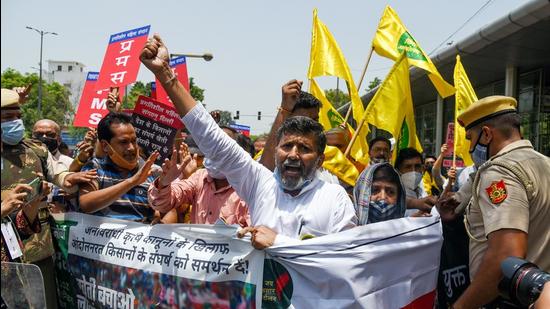Keeping people, not profits, at the centre of reforms
Wealth is the monetisation of value created by the working class with their toil. Respect these value creators first
The 30-year anniversary of economic reforms in India comes in the backdrop of the continuing unprecedented struggle by our farmers against the three new agri laws and for a legal guarantee of a minimum support price (MSP) regime. These evoke memories of the Champaran satyagraha against forcible Indigo plantations a century ago, corporate farming, destruction of petty production (through Narendra Modi’s policy of demonetisation), and food shortages.

Global and Indian experience has shown that the reform decades have been solely focused on maximising profits at the expense of impoverishing people, growing poverty, exponentially widening economic inequalities, and a sharp fall in domestic demand in all countries. The global economic slowdown and its impact on people’s life were devastatingly magnified with the onset of the pandemic that continues to ravage. This is a reminder of what Marx had once said: “Capitalism has conjured up such gigantic means of production and of exchange, it is like the sorcerer who is no longer able to control the powers of the nether world whom he has called up by his spells.”
Also Read | Stir against farm laws: Now, farmers mobilising migrant workers against Centre’s agri laws
Even during this pandemic year, the rich have become wealthier. 16 American billionaires are worth at least twice as much as they were in March last year. Indian billionaires have obscenely fattened their wealth. Global poverty and hunger have sharply grown, impoverishing billions.
India’s reform decades have sharply increased economic inequalities by focusing on being profit-centric rather than being people-centric. Prime Minister (PM) Modi exhorts us to respect wealth creators. Wealth is nothing but the monetisation of value, that is produced by the working people. It is the value creators that need to be respected for the overall wealth of our people.
Along with abolishing the Planning Commission, the Modi government abandoned the basic nutritional norm to measure poverty levels that India followed since Independence. The nutrition norm was fixed at 2,200 calories per person per day in rural and 2,100 calories in urban India. The NSS large sample survey shows that, according to this norm, 58% in rural and 57% in urban India in 1993-94 were below this poverty line. The next similar NSS survey, taking into account the same norms, for 2011-12 shows the percentages were 68 and 65 respectively. The next large sample survey was done in 2017-18. But these NSS findings were suppressed by the government to conceal the truth. It is also destroying our world-acclaimed database institutions. The data that leaked to the media showed an absolute drop of nine per cent in per capita real consumption expenditure (not just food) in rural India.
Clearly, there was an unprecedented increase in absolute poverty in both rural and urban India even before the pandemic struck. The situation since has become worse.
Today, the Global Hunger Index places India in the “serious category”. NFHS-5 shows alarming growth of malnutrition, particularly among children, infant mortality and other indices. In May, India was downgraded by two ranks in the SDG global index. During the past year, Pew Research Centre estimates that the number of people below poverty line in India has grown from 60 to 134 million. India has contributed 57.3% to the growth of the global poor last year, even as 59.3% of our middle classes have slipped into poverty.
What has emerged since 2014 is a venal cocktail of the fusion of corporate-communal nexus. This aggressively pursues profit maximisation through the loot of national assets, large-scale privatisation of the public sector, public utilities and mineral resources. This results in unprecedented levels of crony capitalism and political corruption. This is accompanied by ruthless attacks on people’s democratic rights, civil liberties and human rights, treating all dissent as anti-national, indiscriminately arresting people under draconian laws such as Unlawful Activities (Prevention) Act/sedition, a process that undermines the Indian Constitution and its guarantees to the people.
This has led the global organisations to declare India an “electoral autocracy”. The global economic freedom index places India at 105, worsening from 79 last year. Human Freedom Index ranks India 111, down from 94. The UNDP Human Development Index pushed us down to 131 from 129 last year. Along with growing misery for the vast majority of our people, this rising authoritarianism is moving close to Mussolini’s ominous definition of fascism as a “fusion of corporates with governance”.
Globally, the bankruptcy of neoliberal reforms to revive the economy is being increasingly recognised. All advanced countries have announced stimulus packages of massive State expenditures, anathema to neoliberalism. These are aimed at reviving domestic demand and economic activity. British Prime Minister Boris Johnson prefaced a recent speech advocating increased governmental expenditures by saying: “I am not a Communist, but….”.
The Modi government, however, is reticent to hike expenditure even while writing off huge unpaid loans taken by its cronies. It imposes more crushing burdens on the people through daily fuel price hikes and consequent overall inflation. This is depressing domestic demand further, deepening economic recession.
We, in India, need to seriously introspect about this reform trajectory and reorient our priorities — strengthen agriculture and food security; invest in health and education; sharply increase public investments to build our much-needed infrastructure, both economic and social, to generate jobs and bolster domestic demand. And this is not for humanitarian concerns alone. This is the only way for an equitable economic revival. Along with it, we must prioritise ecological concerns, appropriate technology and, most importantly, reject all divisive polarising trends that disrupt our social harmony feeding obscurantism and irrationalism, dehumanising our society.
Such are the people-centric, not profit-centric, reforms India needs today.
Sitaram Yechury is the general secretary of the Communist Party of India (Marxist)
The views expressed are personal
Continue reading with HT Premium Subscription





